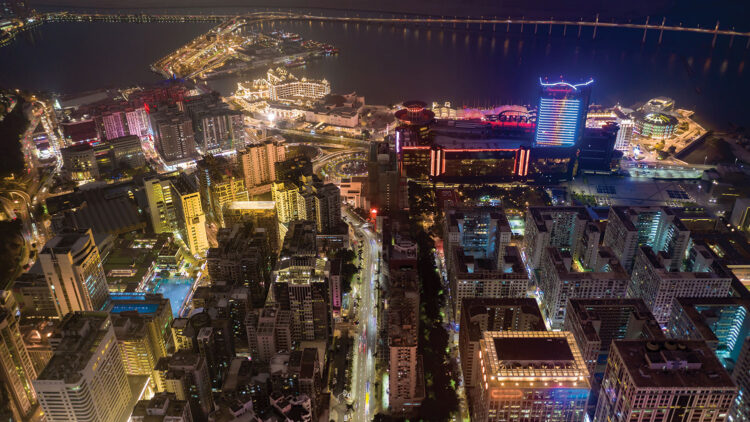On 29 July the Macau government released its RFP documents for the tender for the new Macau casino gaming concessions to be in effect from 1 January next year. Let us look back at the first gaming concessions tender in 2001, immediately after industry liberalization, and the prosperous development of the gaming industry over the past 21 years.
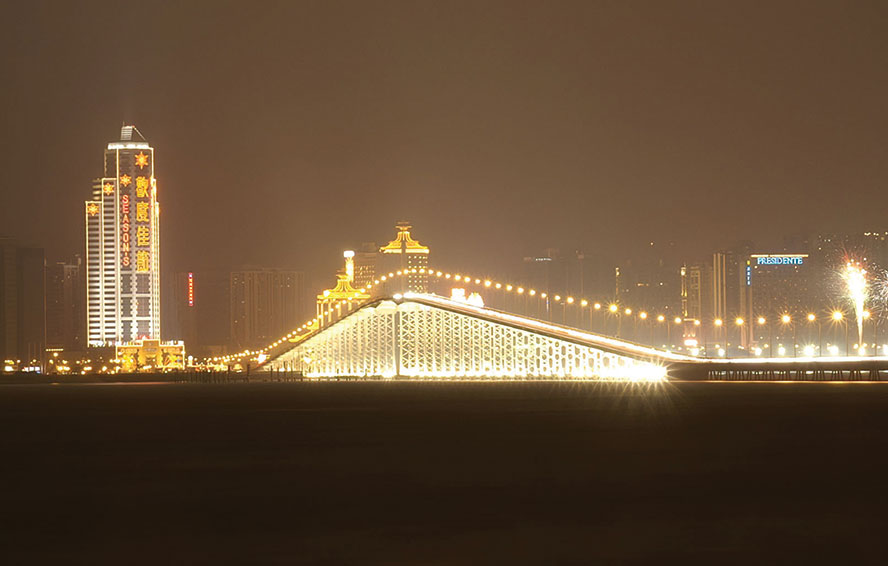 In 1961, Sociedade de Turismo e Diversões de Macao (STDM), founded by Stanley Ho Hon San, Ip Hon, Terry Ip Tak Lei and Henry Fok, won the bidding and was granted the monopoly concession. However, in the mid-1990s, many economic experts from mainland China visited Macau frequently and made comments on the gaming industry. In addition, social opinions continued to oppose the long-standing “monopoly” of Macau’s gambling industry.
In 1961, Sociedade de Turismo e Diversões de Macao (STDM), founded by Stanley Ho Hon San, Ip Hon, Terry Ip Tak Lei and Henry Fok, won the bidding and was granted the monopoly concession. However, in the mid-1990s, many economic experts from mainland China visited Macau frequently and made comments on the gaming industry. In addition, social opinions continued to oppose the long-standing “monopoly” of Macau’s gambling industry.
Immediately after the handover of Macau on 20 December 1999, the first Macau government decided that the casino concession would be opened to bidding upon the expiry of the STDM concession.
22 BIDDING PROPOSALS
On 31 October 2001, the first “Casino Concessions Committee” was established and was chaired by the then Secretary for Economy and Finance, Mr Francis Tam Pak Yuen. The tendering process officially began on 2 November 2001 and concluded on 7 December 2001.
There were a total of 22 bidding proposals received during the period, including six from Macau companies, three from Hong Kong companies, four from US companies, one from a UK company and one from Malaysia. The remaining seven bids were joint bids by companies from Macau, Hong Kong, the United States, Malaysia, New Zealand and the Philippines.
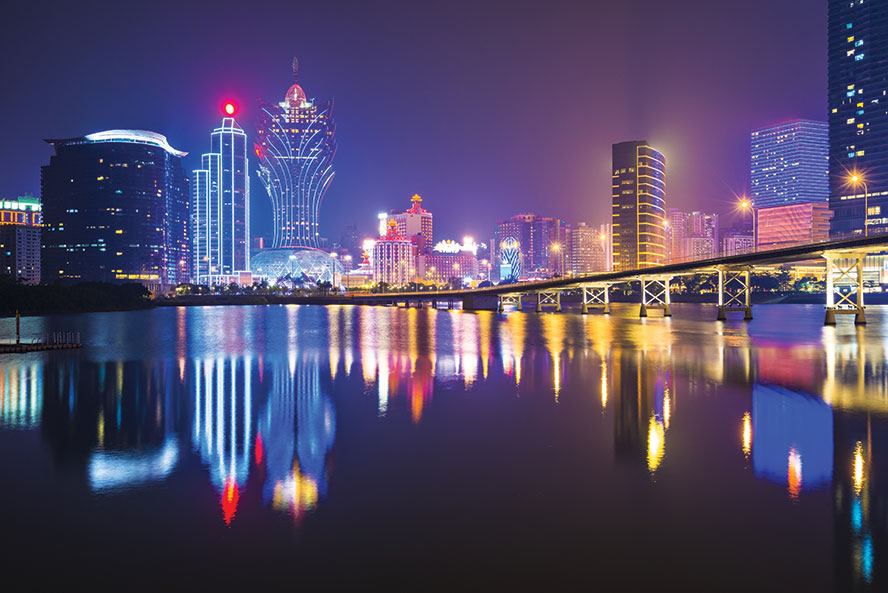 NINE ENTERED CONSULTATION STAGE
NINE ENTERED CONSULTATION STAGE
Three companies had insufficient documents and were disqualified from progressing, so a total of 18 bids were eventually accepted by the government. The consultation stage ran from 3 January to 8 January 2002, during which the 18 companies presented their investment plans to the tender committee.
From 15 to 18 January, the Tender Committee met with nine of the bidders, namely Grand Macau Gaming Limited, MGM Grand (Macao) Limited, Asian American Entertainment Corporation Limited, Sociedade de Jogos de Macau, Macau Star Limited, Lucky 9 Casino Corporation Limited, Sun Entertainment Holding Company Limited, Wynn Resorts (Macau) Limited and MP Entertainment Company Limited.
The nine companies were considered to have the best chance of winning. However, the Macau government at that time denied such claims.
SIX SCORING CRITERIA
According to the tender documents, a rating on a scale of 100 points (from a minimum of 0 to a maximum of 100) was assigned to each bidder for each of the following factors:
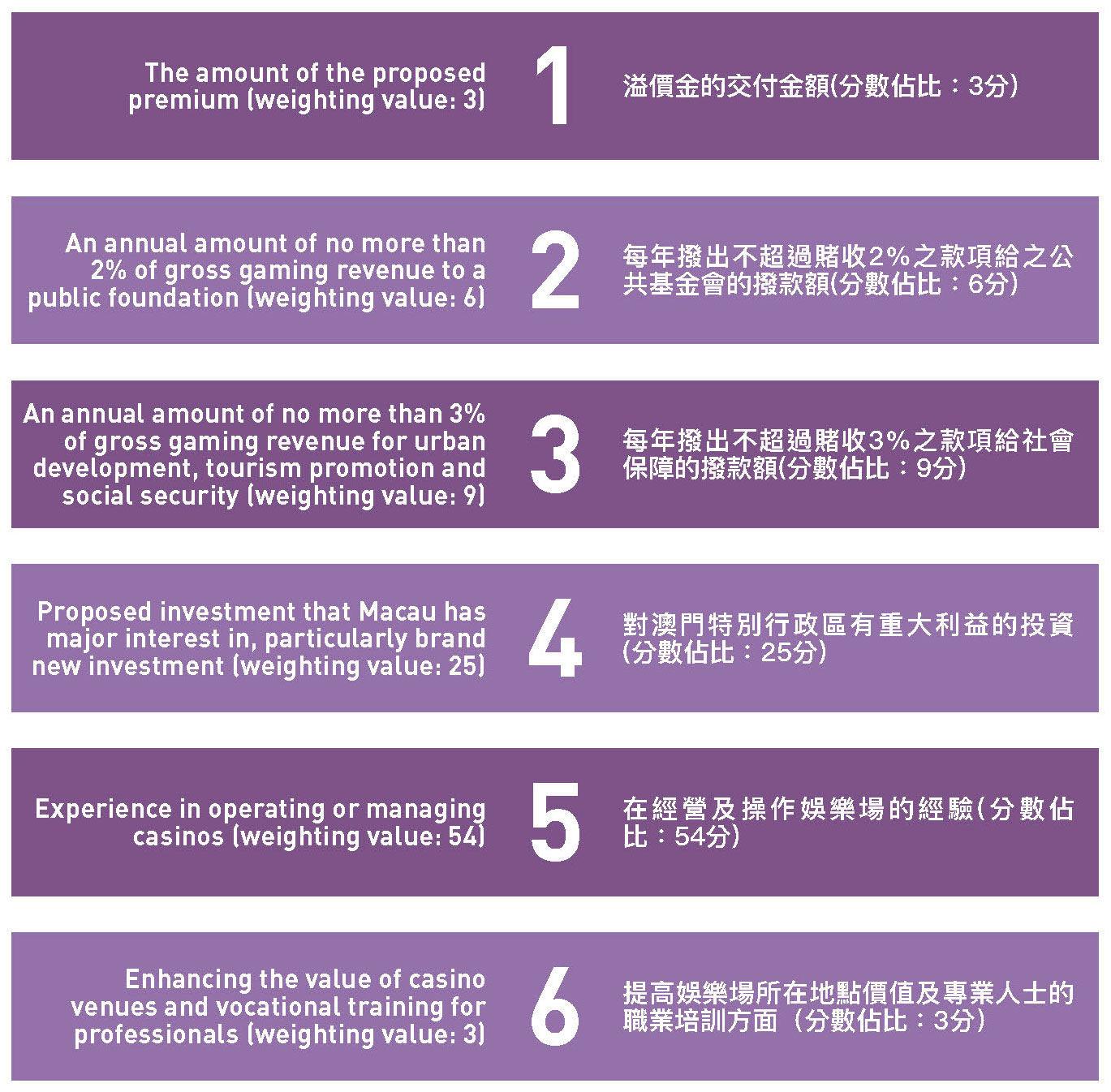 The weightings added up to 100, and with each item scored out of 100 and then multiplied by the weighting, the maximum possible score was 10,000.
The weightings added up to 100, and with each item scored out of 100 and then multiplied by the weighting, the maximum possible score was 10,000.
TENDER CRITERIA
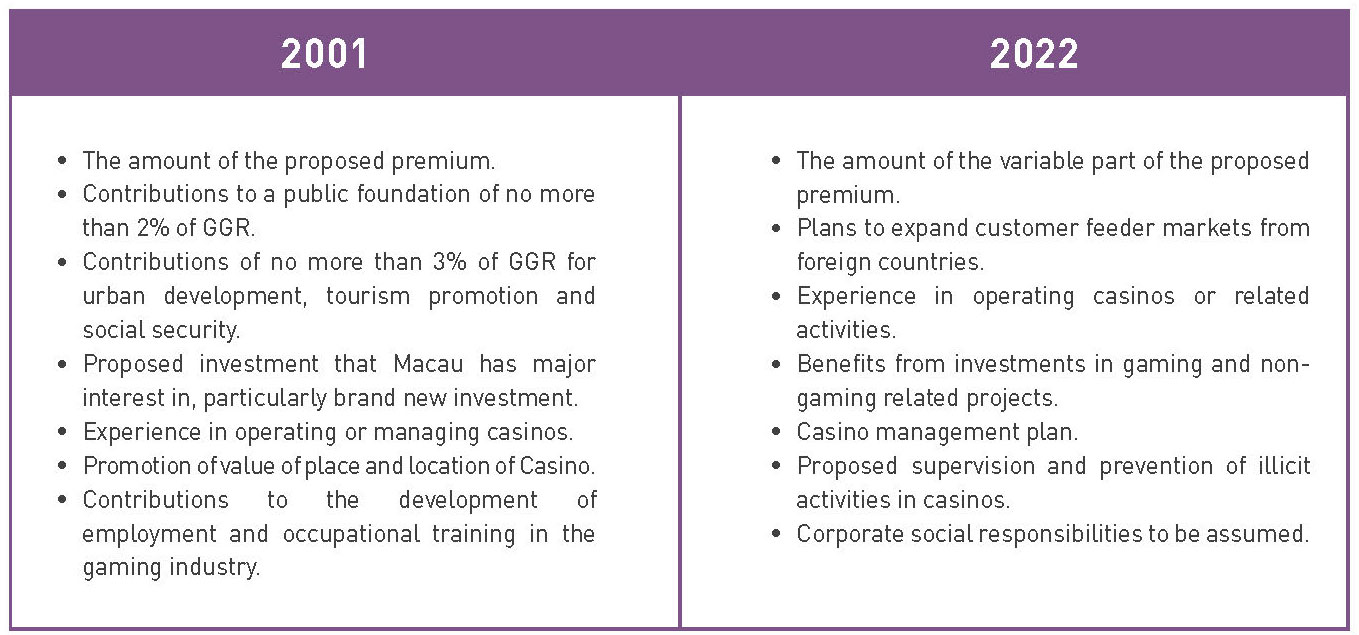 According to the relevant documents of the 2001 tender process, the Government’s main focus was casino operations experience and significant investment in Macau which accounted for a weighting of 79 out of 100.
According to the relevant documents of the 2001 tender process, the Government’s main focus was casino operations experience and significant investment in Macau which accounted for a weighting of 79 out of 100.
WYNN SCORED THE HIGHEST
Among the bidding criteria, “experience in operating casinos” accounted for the most points with a weighting of 54 giving a maximum score possible on this criteria of 5,400 points:
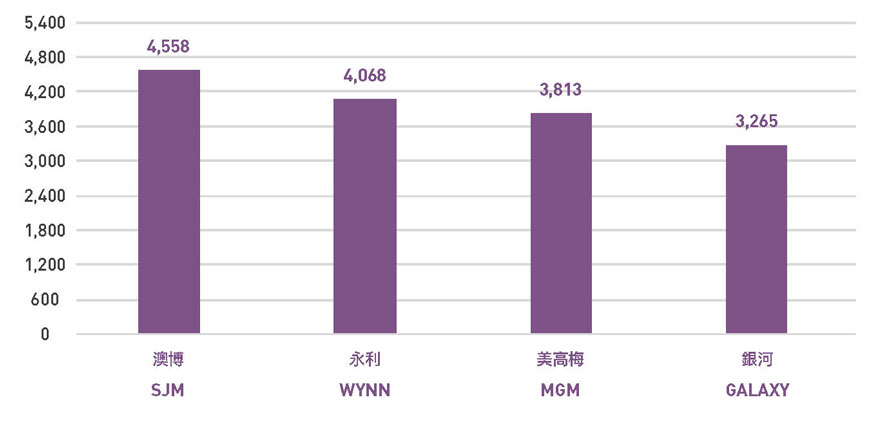 The second-most important criteria was “investments of significant interest to Macau”, with a weighting of 25 giving a maximum score possible on this criteria of 2,500 points:
The second-most important criteria was “investments of significant interest to Macau”, with a weighting of 25 giving a maximum score possible on this criteria of 2,500 points:
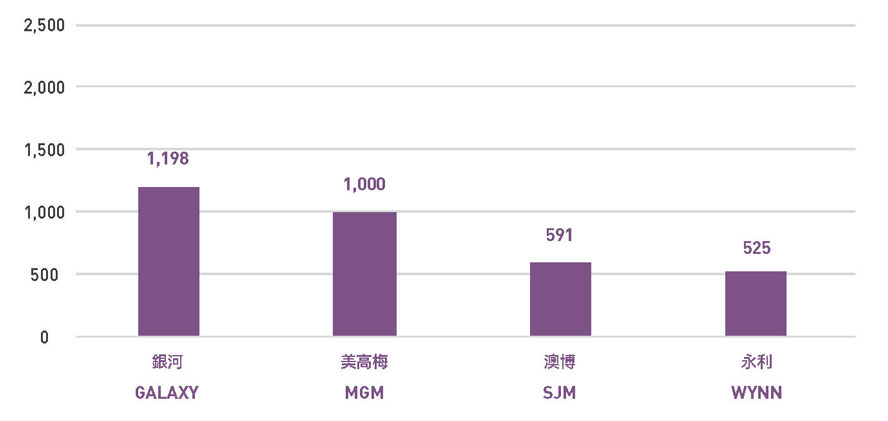
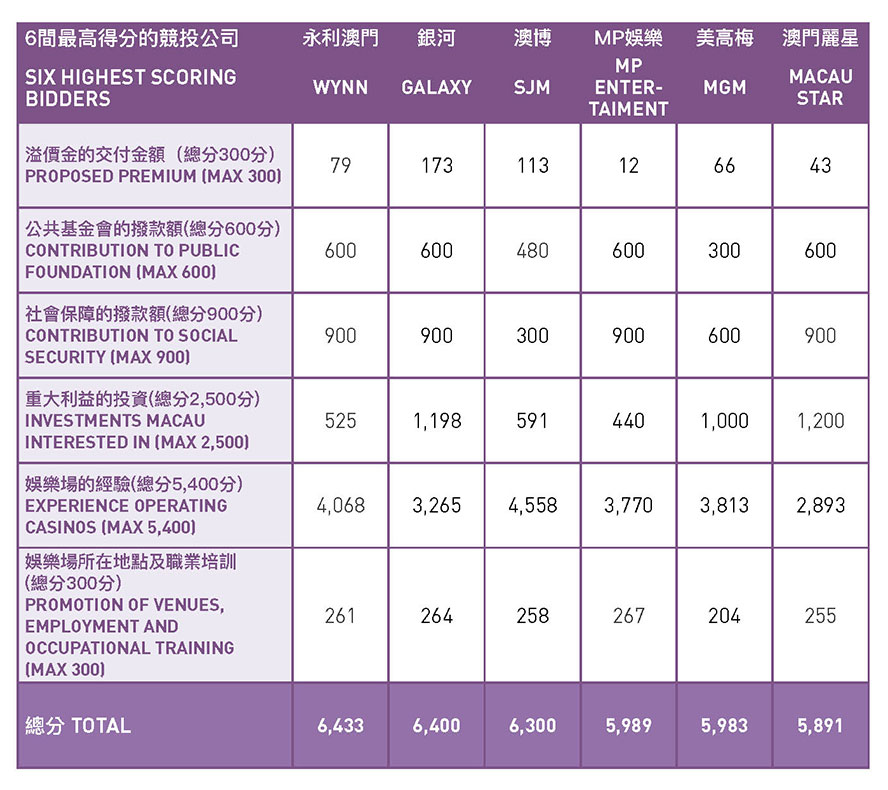 After more than three months of evaluation and consultation, the Macau Government announced the final result on 8 February 2002, and the concessions were granted to three companies, namely Sociedade de Jogos de Macau (“SJM”), a subsidiary of STDM, Galaxy Casino S.A. (“Galaxy”), and Wynn Resorts (Macao) S.A. (“Wynn”). Galaxy was a partnership between Hong Kong’s K. Wah Group (owned by Lui Che-woo) and Las Vegas Sands Corp.
After more than three months of evaluation and consultation, the Macau Government announced the final result on 8 February 2002, and the concessions were granted to three companies, namely Sociedade de Jogos de Macau (“SJM”), a subsidiary of STDM, Galaxy Casino S.A. (“Galaxy”), and Wynn Resorts (Macao) S.A. (“Wynn”). Galaxy was a partnership between Hong Kong’s K. Wah Group (owned by Lui Che-woo) and Las Vegas Sands Corp.
MP Entertainment, MGM and Macau Star were ranked fourth, fifth and sixth.
THREE CONCESSIONS AND THREE SUB-CONCESSIONS
There was ongoing conflict between K. Wah Group and Las Vegas Sands Group, and finally in 2002, the Macau government allowed Galaxy to have a sub-concession relationship with the Venetian Macao S.A.
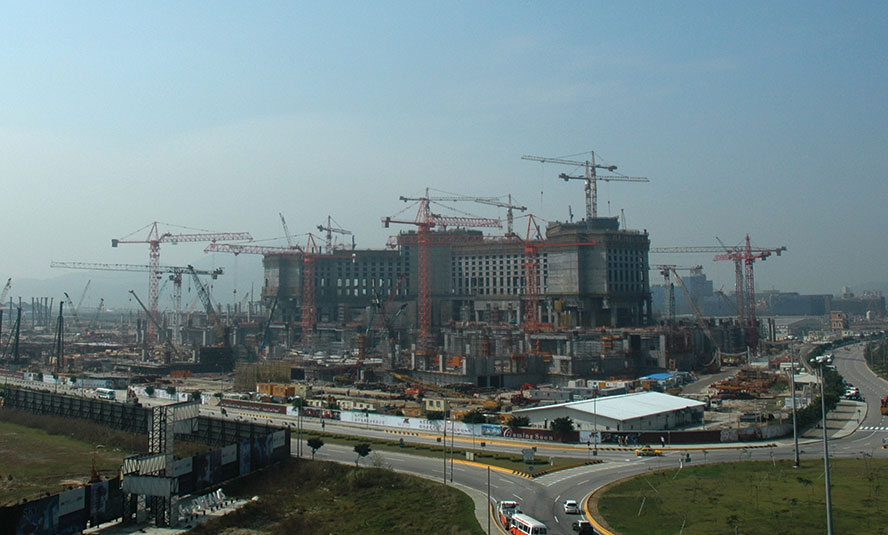
Following that, in 2005, SJM signed a sub-concession agreement with MGM Grand Paradise, S.A, and in 2007, Wynn also signed a sub-concession with Melco PBL Jogos (Macau), S.A., a joint venture between Melco International and Australia’s Publishing & Broadcasting Ltd which was later to reorganize as Melco Resorts & Entertainment Limited.
13-FOLD GGR RISE
The successful completion of the 2001 tendering process saw the six concessionaires granted 20-year concession periods. They each began to fulfil their original bidding promises, starting to build resorts and casinos in Macau.
In May 2004, the first casino of Venetian, Sands Macao, was opened. It was the first ever gaming investment project developed by a foreign company in Macau, marking a new milestone in Macau’s gaming industry.
In July 2004, Galaxy’s first project, Casino Waldo, also commenced operations. Wynn Macau celebrated its first casino hotel’s grand opening in September 2006. Melco PBL’s first casino, Casino Crown (now Altira), opened in May 2007. MGM’s first casino entered into operations in December 2007.
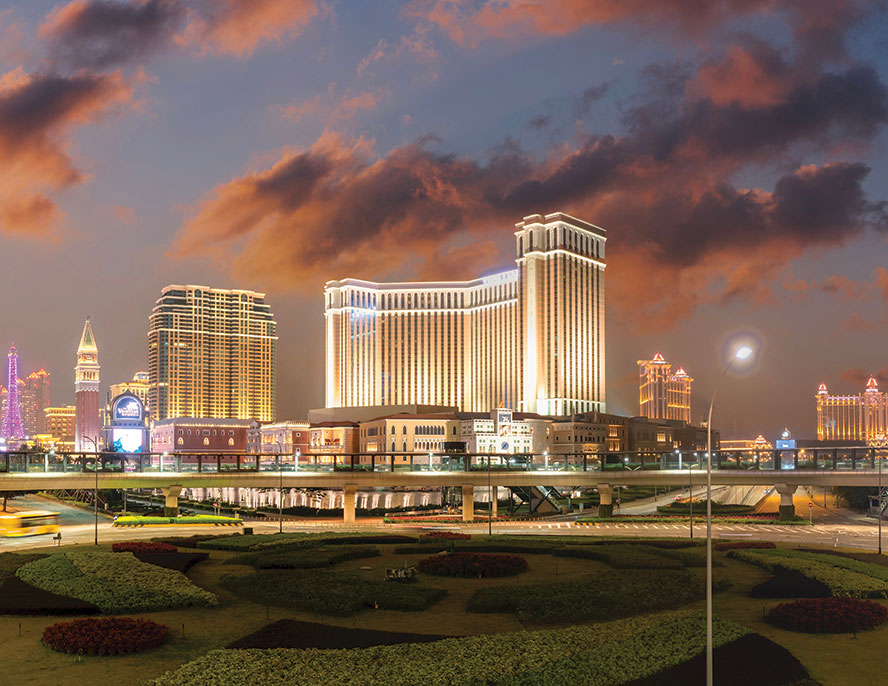 Venetian announced its plans to build on the Cotai Strip in March 2005, bringing Macau’s gaming industry into a new era of integrated resort development. The Venetian Macao opened in 2007 and attracted over 10 million visitors in less than six months. Its success led to the development of the entire Cotai Strip.
Venetian announced its plans to build on the Cotai Strip in March 2005, bringing Macau’s gaming industry into a new era of integrated resort development. The Venetian Macao opened in 2007 and attracted over 10 million visitors in less than six months. Its success led to the development of the entire Cotai Strip.
From 2007 till today, the six concessionaires have built over 20 hotels and 10 casinos on the Cotai Strip. Some of the resorts are still under construction.
Including satellite casinos, there are a total of 37 standing casinos in Macau today, of which 20 are run under the concession of SJM, five under Venetian Macau, four each by Galaxy and Melco, and two each by MGM Grand Paradise and Wynn Resorts (Macau).






